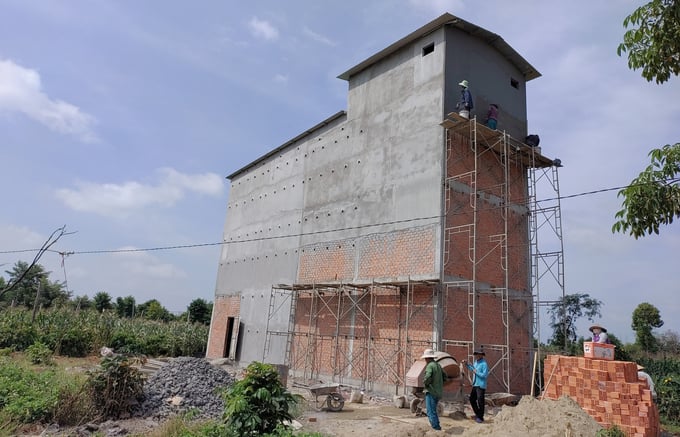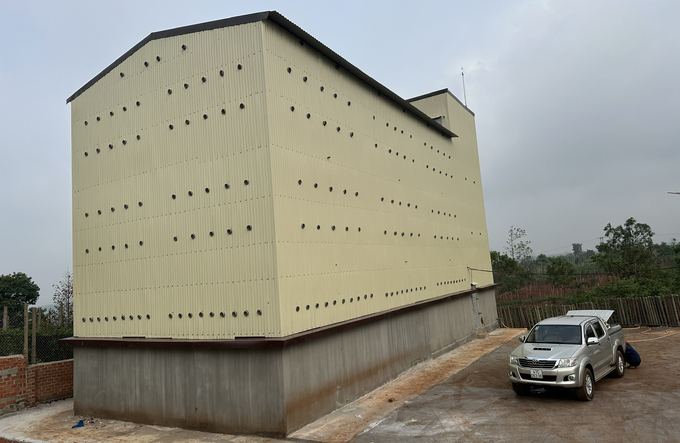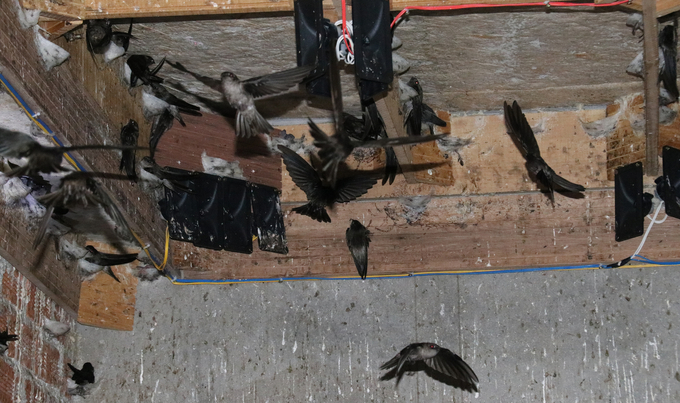May 30, 2025 | 18:03 GMT +7
May 30, 2025 | 18:03 GMT +7
Hotline: 0913.378.918
May 30, 2025 | 18:03 GMT +7
Hotline: 0913.378.918
Around 1,300 swiftlet dwellings are dispersed throughout the province, villages, and cities of Dak Lak. In which provinces, such as Buon Me Thuot City, Ea Kar District, Ea Sup District, and Krong Pac District, swiftlet homes are most densely populated.
According to the Dak Lak Livestock Production and Veterinary Sub-department, despite the fact that commercial swiftlet farming has existed for approximately ten years, it is thriving. It provides swiftlet house proprietors with a substantial income.
Dak Lak is considered to have favorable natural conditions for developing swiftlet agricultural areas, a rapid development rate of swiftlet houses, and a nest quality comparable to that of the Central region.

Dak Lak has favorable conditions so bird's nest farming is developing strongly. Photo: Quang Yen.
Dak Lak province has the highest number of swiftlet houses among the Central Highlands provinces and is among the top 10 provinces and cities with the highest number of swiftlet houses nationwide. The annual production of bird's nests is 10-12 tons, accounting for 6.6% of the country's total output.
Mr. Nguyen Thanh Quynh (Buon Ma Thuot City) revealed that his family realized swiftlet cultivation had enough potential five years ago to invest without hesitation in constructing a two-story swiftlet house in Hoa Khanh commune, Buon Ma Thuot City on a combined area of 240 m2.
To date, the model has provided a consistent source of income for Quynh's family, yielding approximately 30 kilograms of bird's nests and over 700 million VND annually.
According to Quynh, he decided to construct a second swiftlet home, which he will put into operation in the near future, due to the stable operation and revenue of the first.
"Dak Lak's 86 percent agro-forested land provides favorable conditions for the development of swiftlet cultivation. Swiflet is an insectivore and is almost never sedentary.
Mr. Quynh stated that the best food for swiftlets is insects found on fields, hills, and forests, particularly insects that reside about one meter above the ground, including hazardous insects.
Similarly, Mr. Ho Nhat Vy, the head of the swiftlet farming enterprise in Son Hai (City of Buon Ma Thuot), believes that there is tremendous potential for swiftlet farming in Dak Lak due to the region's favorable climate, soil, and food supply.
"My family also established a swiftlet agricultural business in Phu Yen, but the swiftlet population growth there is not as robust as it is here. When we constructed the swiftlet dwellings, a very small number of swiftlets moved in. Mr. Hau determined that the majority of swiftlets in the Central region migrate to Dak Lak during the monsoon season because the local climate is more stable and conducive to sustaining swiftlet colonies.
In 2012, the family began construction on swiftlet dwellings in Dak Lak. Currently, the family has six swiftlet dwellings with a high swiftlet population. Specifically, when we constructed swiftlet dwellings in the Ea Sup region, a large number of swiftlets moved in. Mr. Vy explained that the affluence of food sources and favorable climate contributed to this.

Currently, bird's nest houses are concentrated in Buon Ma Thuot city, Ea Kar district, Ea Sup district, Krong Pac district, and Buon Don. Photo: Quang Yen.
Mr. Vy noted, however, that building permits for swiftlet dwellings are presently overlapping.
"Agricultural land cannot be used for construction, but swiftlet farming must take place far from residential areas, primarily on agricultural land." Additionally, businesses' endeavors to collaborate with local residents have failed. When the business proposes a base price, if the price rises above that, residents sell their goods elsewhere, and if the price falls, they return to sell to the business. This further complicates the industry's long-term growth, Mr. Vy noted.
Mr. Pham Van Hau, the Chairman of the Swiftlet Association in Dak Lak, stated that the association was founded in 2022 and presently has more than 300 swiftlet houses and over 100 members.
According to Mr. Hau, Dak Lak is a relatively new region in the swiftlet farming industry, but it has many development advantages, including natural conditions, soil quality, and numerous food sources.
According to the calculations of the Chairman of the Swiftlet Association in Dak Lak, there will be a harvest beginning in the fourth year of cultivation.
"Farming swiftlets is a beneficial investment with no depreciation, unlike most other ventures. The longer you invest in swiftlet cultivation, the greater your return on investment.

Bird's nest farming developed late in Dak Lak but now provides a good source of income for people. Photo: Quang Yen.
The only difficulty is the absence of specific techniques for attracting swiftlets, which can result in reduced profit margins. About 30% of swiftlet producers in Dak Lak have reduced profits, while the majority are doing exceptionally well.
Nonetheless, swiftlet house construction must be governed by particular regulations. People are anxious to invest in swiftlet home construction but are unsure of how to do so. This land is typically located far from residential areas and is classified as agricultural land. Currently, swiftlet houses are requesting a distinct agricultural permit. Mr. Hau noted that legal procedures are necessary when constructing solid houses.
Translated by Linh Linh

(VAN) Vaccinating juvenile pangasius helps reduce disease, antibiotic use, and farming costs, increasing profits for export-oriented farmers in An Giang.

(VAN) Due to a limited supply of workforce and competitive recruitment requirements, businesses struggle to retain talented veterinary human resources.

(VAN) WOAH’s guidance aims to mitigate disease risks through a One Health approach that balances economic, conservation, and public health interests.

(VAN) Ms. Nguyen Thi Dung, Deputy Director of Ngoc Hoang Cooperative, shared about the journey of bringing dragon fruit to Europe, achieving annual revenues in the billions of VND.

(VAN) Bamboo products from Thang Tho Bamboo Cooperative have reached many countries around the world, while also creating jobs for local workers.

(VAN) The Management Board of Con Dao National Park reported that a green sea turtle, tagged in the Philippines, has traveled thousands of kilometers to lay 84 eggs on Bay Canh Islet.

(VAN) Green technology is paving a new path for sustainable aquaculture in the Mekong Delta in particular and across the country in general, helping reduce emissions and adapt to climate change.